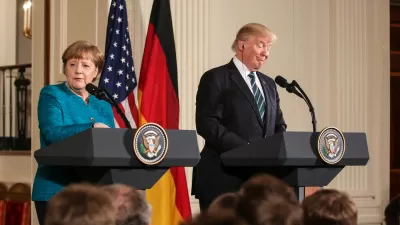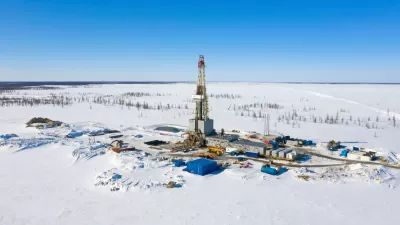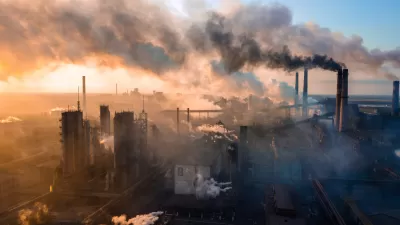It's not so easy weaning itself from dirty coal power, one reason why Germany likely won't meet its 2020 greenhouse gas reduction targets. But they will have plenty of company, though all targets are voluntary.

"As the two-week Bonn talks concluded on Saturday, negotiators said they had made headway on creating a formal process under the 2015 Paris agreement in which world leaders would regularly and publicly detail the efforts they are making to address climate change, pinpoint areas where they are falling short, and push each other to do more," reports Brad Plumer for The New York Times on Nov. 18.
One notable area of shortcoming was an acknowledgment on Wednesday by Chancellor Angela Merkel of Germany, that due to its continued use of high-emission lignite (brown coal) for power generation, it would likely miss its 2020 emissions reductions target "by a wider margin than previously anticipated."
"Now, at the end of 2017, we can see that we still have a good way to go," she admitted in her speech at COP-23. "Coal in particular – and lignite – must make a significant contribution to achieving these goals, she said. Precisely how this will be done must still be clarified."
Yet that was what the Bonn climate talks were in part intended to do, explains Plumer. "Peer pressure," made more difficult by the withdrawal of the U.S. from the accord, will spur "governments back home trying to adopt policies to shift away from fossil fuels, businesses [to] perfect and deploy clean energy technologies, [and] city planners [to] rework their local transportation systems."
The failure of Germany to meet its targets is also a reminder that these targets are voluntary, a point the President Trump and EPA Administrator Scott Pruitt disregarded in their zeal to go "American alone" by rejecting the accord which aims to keep global warming to no more than a 2 degrees Celsius, or 3.6 degrees Fahrenheit, increase in atmospheric temperature.
In fact, "no major industrialized country is currently on track to fulfill its pledge, according to new data from the Climate Action Tracker," wrote Plumer and Nadja Popovich for The Times on Nov. 6.
The coal problem
The Global Carbon Project estimated a 3.5 percent jump in carbon emissions in China this year, due in large part to increased coal burning, as one reason a global three-year pause in the rise of worldwide carbon dioxide emissions is expected to end.
In Europe, seven out of ten of the continent's biggest polluters are now German lignite plants, reports Dave Jones, electricity analyst of UK-based think tank Sandbag, for TheEnergyCollective.com on April 4.
The paradox is that Germany has increased its use of renewables, accounting for "almost 30% of the country’s power mix this year," reported
The problem is that even when renewables produce enough energy to supply all of the country’s electricity, the variability of the renewables means Germany has to keep the coal plants running, over half of which use the dirtiest of all coal, lignite.
Since Germany is phasing out its zero-emission nuclear plants in several years, the situation will only get worse.
"Coal power plant emissions fell by an impressive 11% last year, according to new EU data, but [e]missions from Europe’s 280 coal power plants still accounted for 39% of total emissions for the European Union Emissions Trading System (or Scheme)," the world's first large cap-and-trade program for greenhouse gases, adds Jones.
FULL STORY: At Bonn Climate Talks, Stakes Get Higher in Gamble on Planet’s Future

Alabama: Trump Terminates Settlements for Black Communities Harmed By Raw Sewage
Trump deemed the landmark civil rights agreement “illegal DEI and environmental justice policy.”

Study: Maui’s Plan to Convert Vacation Rentals to Long-Term Housing Could Cause Nearly $1 Billion Economic Loss
The plan would reduce visitor accommodation by 25% resulting in 1,900 jobs lost.

Planetizen Federal Action Tracker
A weekly monitor of how Trump’s orders and actions are impacting planners and planning in America.

Wind Energy on the Rise Despite Federal Policy Reversal
The Trump administration is revoking federal support for renewable energy, but demand for new projects continues unabated.

Passengers Flock to Caltrain After Electrification
The new electric trains are running faster and more reliably, leading to strong ridership growth on the Bay Area rail system.

Texas Churches Rally Behind ‘Yes in God’s Back Yard’ Legislation
Religious leaders want the state to reduce zoning regulations to streamline leasing church-owned land to housing developers.
Urban Design for Planners 1: Software Tools
This six-course series explores essential urban design concepts using open source software and equips planners with the tools they need to participate fully in the urban design process.
Planning for Universal Design
Learn the tools for implementing Universal Design in planning regulations.
Caltrans
Smith Gee Studio
Institute for Housing and Urban Development Studies (IHS)
City of Grandview
Harvard GSD Executive Education
Toledo-Lucas County Plan Commissions
Salt Lake City
NYU Wagner Graduate School of Public Service




























